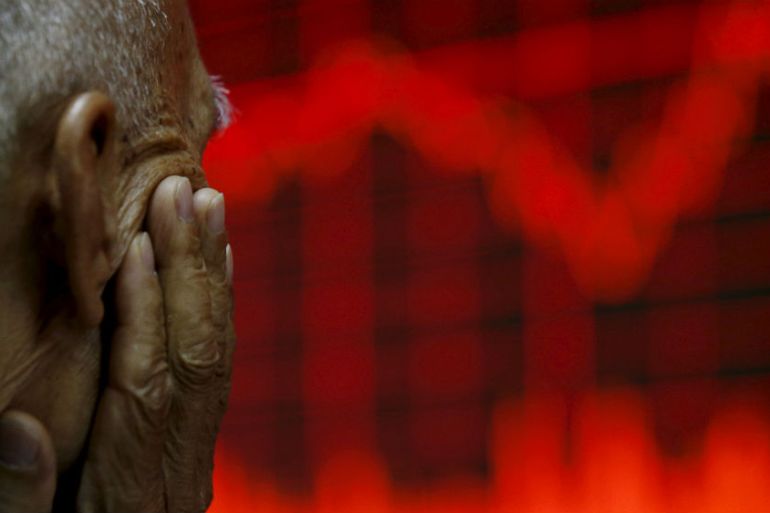Hong Kong shares plunge as US-China trade fears mount
Concerns over the delayed US-China trade deal and China’s economic slowdown led investors to reduce risky shareholdings.

Shares in Hong Kong fell to their lowest levels in two weeks on Friday, leading losses across Asia’s financial markets as uncertainty persisted over a delayed trade deal between the United States and China.
Hong Kong’s Hang Seng Index fell 2 percent after lunchtime protests, prompting investors to take cover by selling down stocks on fears that anti-government demonstrations will escalate over the weekend, Stephen Innes, Asia Pacific Market Strategist at AxiTrader told Al Jazeera.
Keep reading
list of 3 itemsChina furious after Trump signs Hong Kong legislation
Asian investors grow wary as Trump raises tensions over Hong Kong
Mainland China, which is grappling with an economic slowdown, saw its stocks falter a day before the country reports its manufacturing activity. Analysts polled by Reuters expect factory output to fall for their seventh straight month in November.
The country’s benchmark CSI 300 index shrank 1.3 percent on Friday.
Japan’s Nikkei was down by 0.49 percent after the country posted its largest fall in factory output in almost two years. The MSCI Asia Pacific Index outside Japan was weaker by 1.14 percent.
Investors also sought to reduce risk ahead of the US Thanksgiving weekend, especially as the US and China have yet to agree on a long-delayed first-phase trade deal.
“There is no date, no venue and no time set for an agreement to be signed, while the next round of tariffs are supposed to kick in on December 15, which is just two weeks from now,” Bangkok-based Innes said.
Without a trade deal in place, US President Donald Trump could still impose 15 percent tariffs on some $160bn imports from China on December 15, raising prices of consumer goods ahead of the Christmas season.
Innes pointed out that recent headlines suggest the Chinese are taking a swipe at Trump, with former Vice Minister of Foreign Trade Long Yongtu saying that the US leader is “easy to read” and therefore useful to China in trade negotiations.
“Comments like these are compounding the risk sentiment, adding more motivation for traders to lower their risk [by selling off shares],” Innes said.
Adding to those fears is Trump’s support for legislation backing pro-democracy protesters in Hong Kong, which drew a warning from China that it would take “firm counter-measures” against the US.
Anthony Chan, chief Asia investment strategist at Union Bancaire Privee in Hong Kong, said the market is still erring on the side of caution, especially as the year-end approaches.
“There is still downward pressure on earnings. That’s why when there is (negative) geopolitical news, some funds might want to sell and lock in their performance,” he said.
But, on the whole, investors are now betting that while the US legislation spoils the mood, ultimately it remained in the interest of both Washington and Beijing to move forward with talks to get a trade deal.
“The working assumption for most investors is that this will not derail the trade talks, given China is suffering from an economic slowdown,” said Norihiro Fujito, chief investment strategist at Mitsubishi UFJ Morgan Stanley Securities.
China’s financial market is showing additional signs of stress as its biggest stock listing since 2010 drew the lowest demand from retail investors in almost five years, signalling a decline in stock market exuberance and concern over its troubled banking system.
The Postal Savings Bank of China Co, a state-owned lender, hopes to raise as much as 32.7 billion yuan ($4.6bn) from a share sale in Shanghai. But its retail subscription rate of about 79 times, announced on Friday, is the lowest since that of China National Nuclear Power Co in 2015, just before the country’s stock market crash later that month.
At the same time, warning signs are flashing in China’s banking market. The government has this year seized and bailed out lenders amid a surge in bad debt as economic growth slows. It has also pressured banks to step up lending, potentially squeezing margins.